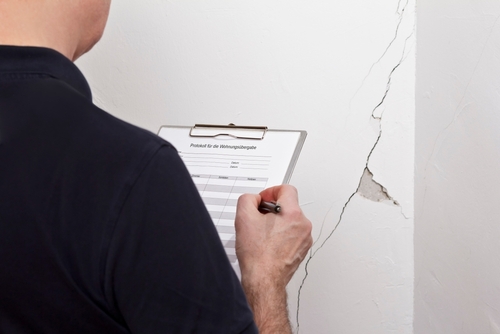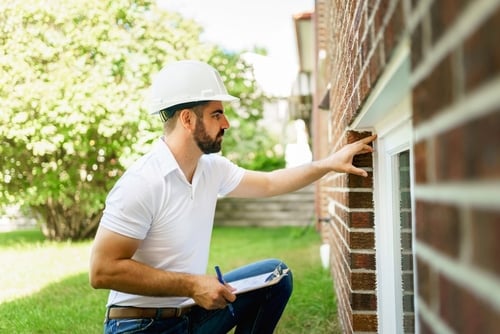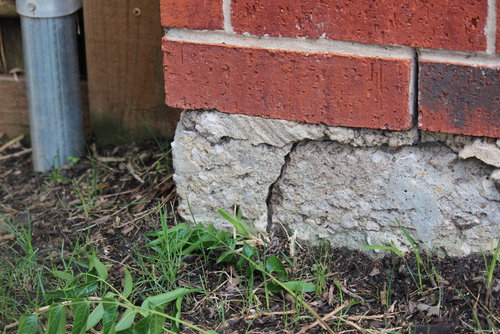When it comes to the foundation of your property, it may be out of sight, out of mind. However, neglecting the foundation of your property can cause major structural damage to your home. Knowing when to inspect the foundation of your property, what to look for, and why they’re so important can help you avoid costly repairs later on. So today, we’ll go over the importance of foundation inspections in rental properties.

Contents of This Article:
- What Are Foundation Inspections?
- When Should You Get a Foundation Inspection?
- What Happens During a Foundation Inspection?
- 10 Indicators of Foundation Problems
- Why Do You Need Regular Foundation Inspections?
- Keep Up With Inspections With Property Management
What Are Foundation Inspections?
A foundation inspection is a thorough examination of a building’s foundation. It assesses the property’s condition, identifies potential issues, and determines the need for repairs or maintenance. For instance, an inspector will look for problems like cracks, shifts, and weaknesses throughout the property’s interior and exterior.
It’s crucial for rental property owners and Northern Virginia property managers to understand the importance of foundation inspections and know when to schedule them. So, read along to learn some of the most important times for inspections, what happens during an inspection, and what signs to look for.
When Should You Get a Foundation Inspection?
If you own rental properties, you’re probably familiar with different types of inspections. There’s typically a move-in inspection, a move-out inspection, and seasonal inspections to check for signs of property damage. However, are you prioritizing foundation inspections? Here are a few times you’ll want to schedule a foundation inspection for your property.

- When Selling a Property
- When Buying a Property
- After Severe Weather
- If You Notice Issues
When Selling a Property
If you’re considering selling your rental property, you’ll want to schedule a foundation inspection. After all, a potential buyer will likely conduct a thorough inspection, and foundational issues can significantly impact the property’s value. So, scheduling a foundation inspection as part of the pre-listing process and addressing any issues can help streamline the selling process.
When Buying a Property
If you’re looking to buy a new rental property, a comprehensive inspection, including a foundation inspection, is crucial. Identifying foundation issues early on can help you decide whether or not the investment property is worth it and can help you negotiate with the seller.
After Severe Weather
Inspecting the foundation is necessary after severe weather events like heavy rainfall, floods, earthquakes, or storms, as it can impact the soil and foundation stability. Assessing the foundation after such events can help identify areas that need repair and can prevent further deterioration.
If You Notice Issues
If you or your tenants notice cracks in the walls, uneven floors, or sticking doors and windows that don’t close properly, you’ll want to schedule an inspection. Ignoring these issues can lead to more extensive and costly damage over time. So, it’s important that you know what to look for during a routine inspection and that your tenants know when to report any major structural issues.
What Happens During a Foundation Inspection?
Foundation inspections help identify any potential issues that may cause damage to the structural integrity of your rental property. During an inspection or walk-through, a professional inspector will look for several things. Here’s what to expect in a typical inspection.
- Visual Inspection
- Measurement of Cracks
- Interior and Exterior Inspection
- Review Previous Repairs
- Evaluate Moisture
- Document and Report Findings
Visual Inspection
A home inspector will start by visually examining the foundation from both the inside and the outside of the property. This involves looking for any visible signs of foundation issues like cracks, shifts, or signs of damage.
Measurement of Cracks
If they find any visible cracks, the inspector will measure their width, length, and direction and document where they’re located. This information helps in determining the severity of the foundation issue.

Interior and Exterior Inspection
Inside the property, an inspector will look for signs of foundation problems like uneven floors, sticking doors or windows, and cracks in the walls or ceilings. On the outside of the property, they’ll look for cracks, bulges, or settling. They may also look at the condition of the drainage system and soil around the foundation.
Review Previous Repairs
If there have been previous foundation repairs, an inspector will review their quality and effectiveness. This information can help understand the history of the foundation and ensure the repairs are effective and holding up well.
Evaluate Moisture
Moisture issues around the foundation can impact the stability and condition. Inspectors will use tools to look for signs of water damage, assess drainage systems, and look for signs of excessive moisture that could affect the foundation. Evaluating moisture is crucial in preventing issues like mold growth or soil expansion.
Document and Report Findings
After the inspection, the inspector will provide a detailed report of their findings, outlining any issues found and recommended solutions. This report is crucial for property owners so that they can address any issues immediately.
10 Indicators of Foundation Problems
Foundation issues can manifest in various ways. As such, recognizing the indicators immediately can help address issues before they escalate. Here are ten common indicators of foundation problems to watch out for.
- Cracks in the Walls or Floors- Visible cracks, especially if they’re wider than ¼ inch, can indicate foundation settlement or movement.
- Uneven Floors- Floors that slope or feel uneven can indicate issues like settling or shifting of the foundation.
- Doors and Windows Sticking- If you notice that it’s difficult to open or close the doors or windows, it can be a sign of foundation movement or changes.

- Gaps Around Windows or Doors- Gaps between doors, windows, and their frames can signal foundation movement or settlement.
- Cracks in the Ceiling- Cracks in the ceiling can indicate a shifting foundation, especially if they appear suddenly.
- Bowing or Leaning Walls- Walls that appear to bow or lean inward can be a sign of structural issues and foundation instability.
- Mold or Mildew Growth- Excessive moisture caused by foundation problems can lead to mold or mildew growth in basements or crawl spaces.
- Chimney Separation- Separation between the chimney and the rest of the structure can indicate foundation settlement or movement.
- Basement or Crawl Space Moisture- Moisture issues in basements or crawl spaces can result from poor foundation drainage or cracks.
- Sinking or Settling Foundation- Visible signs of the foundation sinking or settling, like a noticeable slope in the structure, should be investigated promptly.
Why Do You Need Regular Foundation Inspections?
Regular foundation inspections are important for a few main reasons. One of the most important reasons is that they can prevent further damage to your property. Finding small cracks or minor damage from the start can save you from costly and more expensive damage later on. Taking care of these issues immediately ensures they don’t become bigger problems.
Another reason they’re important is to ensure the health and safety of your tenants and the property. After all, a damaged foundation can compromise the structural integrity of the property and can pose a threat to your tenants’ safety. Cracks in the foundation can lead to water retention and moisture, which may result in mold if not handled properly.
Finally, inspections are crucial if you’re looking to buy a new property. The last thing you want is to invest in a property that has foundational issues that will be costly to resolve later on.
Keep Up With Inspections With Property Management
When owning rental properties, keeping up with routine inspections is crucial. Whether it’s a move-in inspection, seasonal inspection, or foundation inspection, you don’t want to skip these crucial tasks. Regular foundation inspections can help you identify potential issues that can save the structural integrity of your property later on. So, don’t neglect your property, and make sure to schedule inspections after severe weather, if you plan to sell the property, or just seasonally.
Need More Advice? contact us today!
If you need help keeping up with inspections or other day-to-day property management tasks, you may want to hire a property management team. Professional property managers like those at Bay Property Management Group can help you ensure your property is in top-notch condition before, during, and after renting to tenants. Whether it’s rental property marketing, tenant screening, routine maintenance, or collection rent payments, we’re there to help. So, contact BMG today to learn more about our services throughout Baltimore, Philadelphia, Northern Virginia, and Washington, DC.

